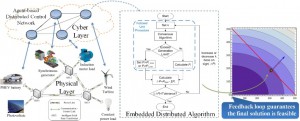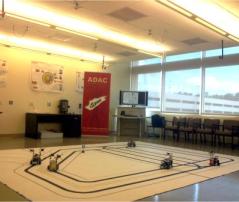
by chow | Sep 27, 2012 | Current research
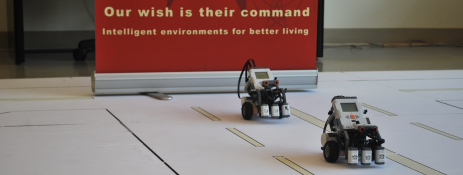
Intelligent Space (iSpace) is a relatively new concept to effectively use distributed sensors, actuators, robots, computing processors, and information technology over communication networks. iSpace is a large scale Mechatronics System by integrating sensors, actuators, and control algorithms in a communication system using knowledge from various engineering disciplines such as automation, control, hardware and software design, image processing, communication and networking.
Documentations
by chow | Sep 27, 2012 | Completed projects
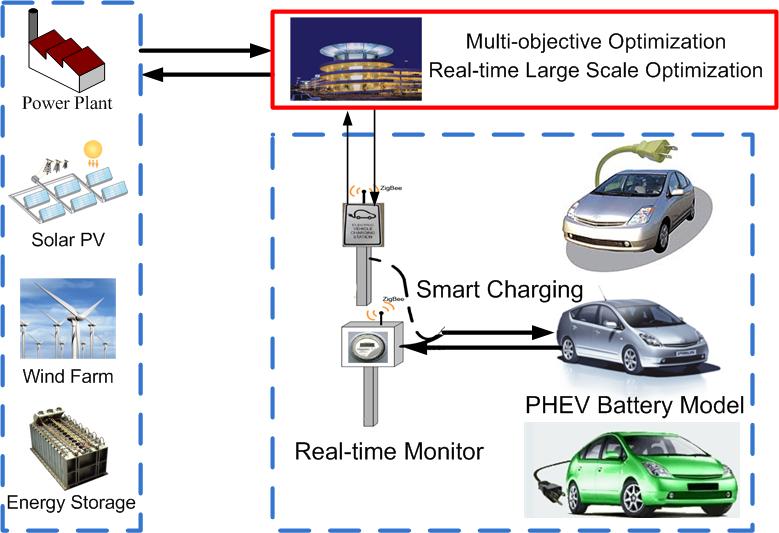
Within the next 5 years, there will be a significant increase in the number of plug-in hybrid electric vehicles (PHEVs) and plug-in electric vehicles (PEVs). Since these vehicles utilize grid power for charging, this growth could pose potential threats and benefits for the existing power grid. The main challenge is that when a large number of PHEVs/PEVs simultaneously connect to the grid, the overall power system quality and stability can be severely affected due the large amount of power consumption. The addition of PHEVs and PEVs into our society is an exciting view into the future of electric vehicles, but the power grid must be able to support these new vehicles. By smartly controlling their charging process, the utility can utilize the flexible nature of these loads for peak shaving and valley filling to improve the quality of power. Since these vehicles also have the potential to transfer power back into the grid when it is needed (i.e., when the demand for power is high), a more robust power grid, or ‘smart grid’, is needed.
This project deals project with the pros and cons of PHEVs/PEVs by formulating optimization problems that consider power grid stability and customer satisfaction concurrently through proper choice of the cost function and equality and inequality constraints. Two main approaches are then considered for online, real-time solutions of these optimization problems:
- Centralized Approach: In this approach, the information regarding the charging process of vehicles such as SoC, Energy Cost, Time of Stay, Available Power and etc. is sent to a central control unit, which based on power system stability and customer satisfaction allocates the charging powers to the vehicles for each time step. Various algorithms such as Particle Swarm Optimization (PSO), Auction Theory and Estimation of Distributed Algorithms (EDA) are used to deal with the nonlinear and large scale nature of the problem.
- Distributed Approach: In this approach the central unit is eliminated and charging stations cooperatively find the optimal power allocations by exchanging information among each other. This approach is highly efficient in terms of computational and communicational effort, considering that the overall optimization problem is large scale and nonlinear.
To demonstrate our algorithms, we have developed a digital testbed for a large-scale PHEV/PEV parking deck in Matlab/Simulink and Labview. This testbed is able to show a reliable two-way communication system between all the parties involved. This includes vehicles, charging stations, and the Intelligent Energy Management System (iEMS). Communication can occur through both the Internet and the ZigBee network. We then use Monte Carlos simulation to evaluate the effectiveness of our algorithms.
Documentations
-
“A Digital Testbed for a PHEV/PEV Enabled Parking Lot in a Smart Grid Environment“, 2012 Innovative Smart Grid Technologies Conference (ISGT 2012), Washington D.C., U.S.A., Jan 18, 2012
-
“Performance Optimization of a PHEV/PEV Enabled Municipal Parking Deck in a Smart Grid Environment“, 2011 IEEE Power and Energy Society General Meeting, Detroit, Michigan, U.S.A., July 24, 2011
-
“Investigating a Large-scale PHEV/PEV Parking Deck in a Smart Grid Environment“, 43rd North American Power Symposium, Boston, MA, August 4-6, 2011
-
“Microgrid Planning and Operation: Solar Energy and Wind Energy“, 2010 IEEE Power and Energy Society General Meeting, Minneapolis, Minnesota, U.S.A. July 25, 2010
-
“ An Intelligent Energy Management System for Charging PHEVs Considering Demand Response,” 2010 FREEDM Annual Conference, Tallahassee, Florida, U.S.A, May 18, 2010
Links
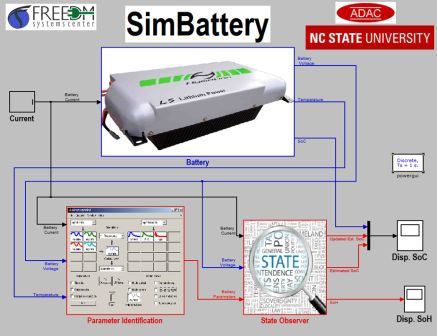
by chow | Sep 27, 2012 | Completed projects
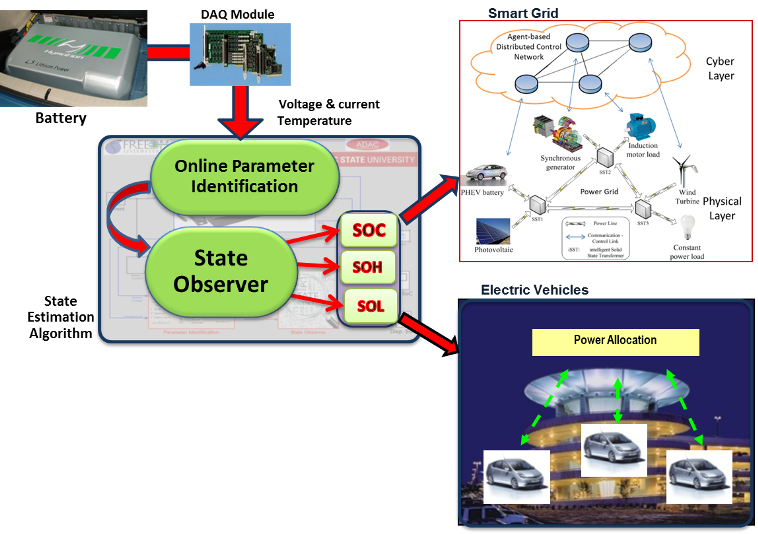
The recent acceleration of the battery technology, due to emergence of smart grid and electric vehicle (EV) applications, has increased the demand for advanced battery management systems (BMS). State of charge (SOC) and State of health (SOH) estimation are two of the main features of the BMS. Although there have been several attempts to estimate the battery states, the results do not have enough accuracy to satisfy sensitivity analysis criteria for reliability assessment and energy efficiency purposes. The goal of this project is to develop algorithms to estimate the State of Charge (SOC) and State of Health (SOH) of the battery accurately in these applications.
Considering an RC equivalent circuit to model the battery dynamics, we design an adaptive on-line parameters/SOC/SOH co-estimation algorithm that identifies different parameters of the battery model at various temperature, ageing, SOC and charging/discharging rate conditions. This model with updating parameters is used to estimate the SOC with compensating the initial SOC error, accumulative error and noise effect. The estimated SOC and the updating model are also utilized to estimate the full capacity and internal resistance of the battery. This information along with the statistical data regarding the application and the battery performance degradation are deployed to predict the remaining useful life (RUL) and end of life (EOL) as indicators of the battery SOH.
Publication
- Rahimi-Eichi and M.-Y. Chow, “Batteries,” in Handbook of Energy, G. M. Crawley, Ed., ed USA, World Scientific Publishing Company and Imperial College Press, 2012.
- Rahimi-Eichi, F. Baronti, and M. Y. Chow, “Online Adaptive Parameter Identification and State-of-Charge Coestimation for Lithium-Polymer Battery Cells,” Industrial Electronics, IEEE Transactions on, vol. 61, pp. 2053-2061, 2014.
- Rahimi-Eichi, U. Ojha, F. Baronti, and M. Chow, “Battery Management System: An Overview of Its Application in the Smart Grid and Electric Vehicles,” Industrial Electronics Magazine, IEEE, vol. 7, pp. 4-16, 2013 (Best Paper Award).
- Otero, H. Rahimi-Eichi, J. J. Rodriguez-Andina, M.-Y. Chow, “FPGA Implementation of an Observer for State-of-Charge Estimation in Lithium-Polymer Batteries”, presented at IEEE International Conference on Mechatronics and Control (ICMC), Jinchou, China, 2014 (Best paper award).
- Rahimi-Eichi, B. Balagopal, M.-Y. Chow, and T.-J. Yeo, “Sensitivity Analysis of Lithium-Ion Battery Model to Battery Parameters,” presented at the 39th Annual Conference of the IEEE Industrial Electronics Society (IECON2013), IEEE, Vienna, Austria, 2013.
- Baronti, W. Zamboni, N. Femia, H. Rahimi-Eichi, R. Roncella, S. Rosi, et al., “Parameter identification of Li-Po batteries in electric vehicles: A comparative study,” presented at the IEEE International Symposium on Industrial Electronics (ISIE2013), pp. 1-7, Taipei, Taiwan, 2013.
- Rahimi-Eichi and M.-Y. Chow, “Adaptive online battery parameters/SOC/capacity co-estimation,” presented at the Transportation Electrification Conference and Expo (ITEC2013), IEEE, pp. 1 – 6, Metro Detroit, Michigan, USA, 2013.
- Rahimi-Eichi and M.-Y. Chow, “Adaptive parameter identification and State-of-Charge estimation of lithium-ion batteries,” presented at the 38th Annual Conference on IEEE Industrial Electronics Society (IECON 2012), IEEE, pp. 4012 – 4017, Montreal, QC, Canada, 2012.
- Rahimi Eichi and M.-Y. Chow, “Modeling and analysis of battery hysteresis effects,” presented at the Energy Conversion Congress and Exposition (ECCE2012), IEEE, pp. 4479-4486, Raleigh, NC, USA, 2012.
- Rahimi-Eichi, F. Baronti, and M. Y. Chow, “Modeling and online parameter identification of Li-Polymer battery cells for SOC estimation,” presented at the International Symposium on Industrial Electronics (ISIE2012), IEEE, pp. 1336-1341, Hangzhou, Zhejiang, China, 2012.
Links
by chow | Sep 27, 2012 | Completed projects
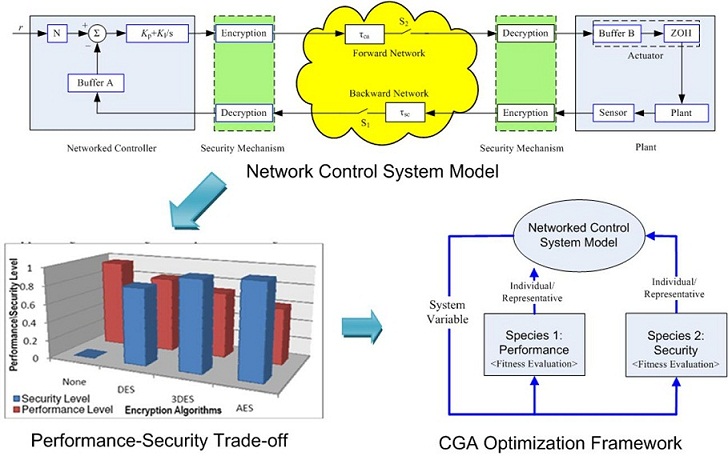
Project Description:
Since Networked Control Systems (NCS) are vulnerable to various network attacks when the network used is insecure, they need to be well protected by security mechanisms from the malicious attackers on the Internet, which may sacrifice its performance due to limited system resources. Thus, there is a need to address the issue of the trade-off between NCS security and its real-time performance.
Using the networked DC Motor system as a typical example, we have developed a trade-off model for performance and security on NCS. This model can be used to adapt security configurations to provide sufficient protection and satisfy real-time dynamic performance requirements of the NCS simultaneously. The construction of this model includes the development of a set of metrics to quantitatively measure the performance and security levels of NCS and the development of a trade-off objective function incorporating performance and security. We have also established a framework of performance-security trade-off optimization based on Coevolutionary Genetic Algorithm (CGA) for the networked DC motor system. Simulations and experiments have shown that CGA is an effective approach for performance-security trade-off analysis and optimization on NCS.
Publications
- W. Zeng and M.-Y. Chow, “Modeling and Optimizing the Performance-Security Tradeoff on D-NCS Using the Coevolutionary Paradigm,” IEEE Transactions on Industrial Informatics, vol. 9, pp. 394-402, 2013.
- W. Zeng and M.-Y. Chow, “Optimal Trade-off between Performance and Security in Networked Control Systems based on Coevolutionary Algorithms,” IEEE Transactions on Industrial Electronics, vol. 59, pp. 3016-3025, 2012.
- W. Zeng and M.-Y. Chow, “CGA Based Performance-Security Trade-Off Optimization in a Networked DC Motor System”, IEEE International Symposium on Industrial Electronics (ISIE12), Hangzhou, Zhejiang, China, May 2012.
- W. Zeng and M.-Y. Chow, “A Trade-off Model for Performance and Security in Secured Networked Control System”, IEEE International Symposium on Industrial Electronics (ISIE11), Gdansk, Poland, June 2011.
Links
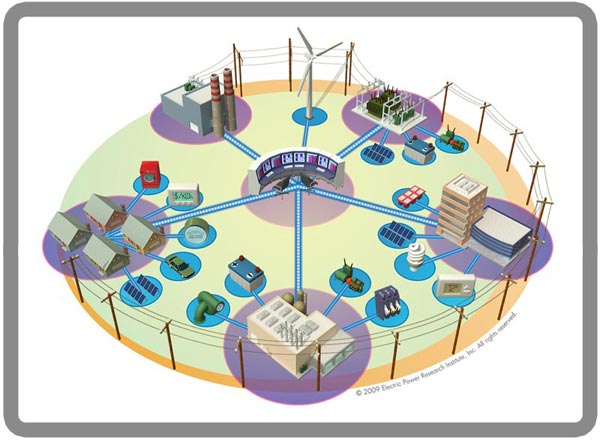
by chow | Sep 27, 2012 | Completed projects
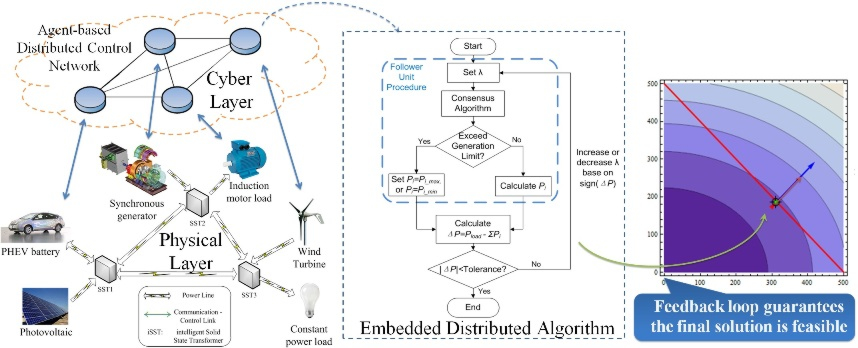
Compared with the conventional centralized control, distributed control can prevent single point of failure and ease heavy data exchange demand among controllers, thus distributed control are more suitable for large-scale systems. This project investigates the design and control of next generation power systems. The objective of this project is to design and implement distributed controls to achieve real-time intelligent power allocation in FREEDM systems. A prototype of a control algorithm to be used in FREEDM systems is shown in the diagram. A communication and control network will be integrated into the power grid. To balance the supply and demand of the power grid under different constraints, the distributed consensus managers which have been built on top of the physical system will optimize their actions based on the available power generation capacities.
Graph theory has been used to model the FREEDM network. Laplacian matrix and Row-Stochastic matrix are used to represent the topology of the FREEDM network configuration. Consensus algorithms have been used to decentralize and solve the economic dispatch problem. Adaptive sampling strategies and distributed bandwidth allocation algorithms to handle bandwidth limitation. Further issue such as synchronizability of networks, sensitivity of time-delay, robustness, resilience to power grid and communication network outages will be considered in this project.
Documentations
Links
Images

by chow | Mar 18, 2012 | Completed projects
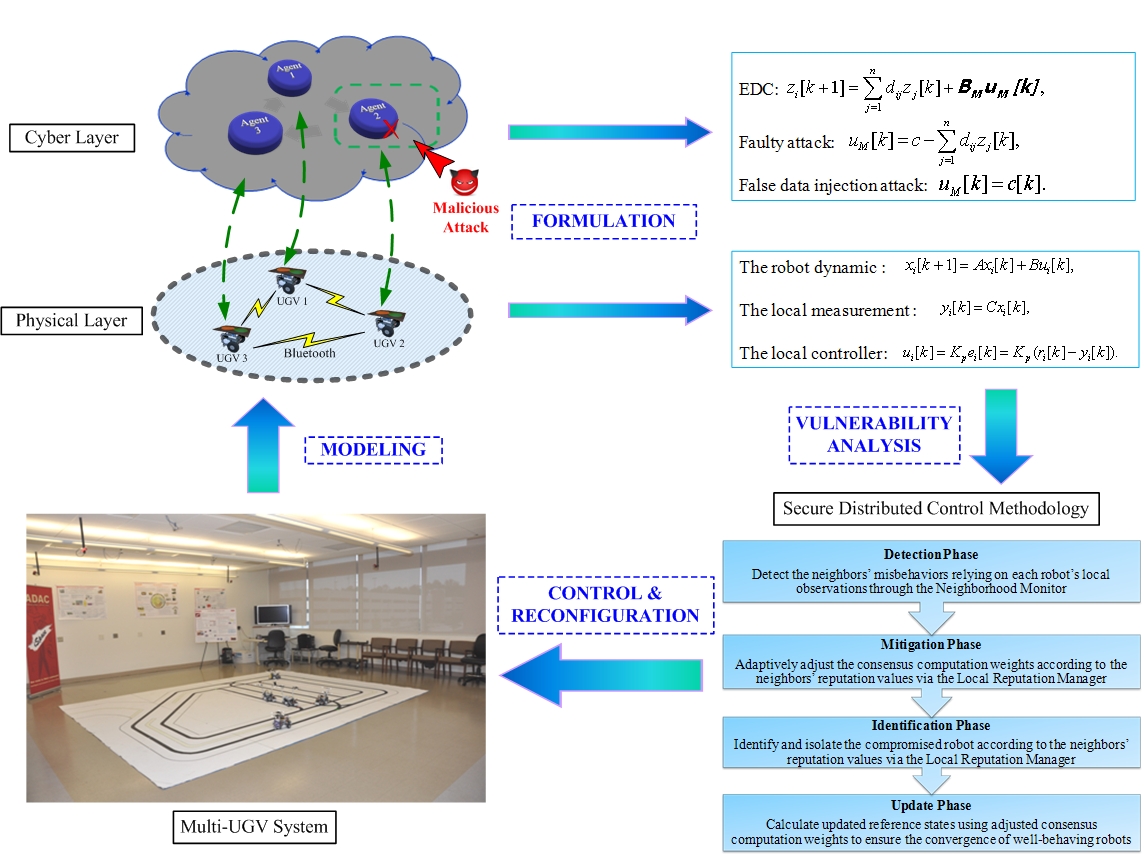
Project Description:
While most Networked Control systems (NCS) have been safe in the past, they are increasingly more vulnerable to malicious cyber attacks and malwares (e.g. Stuxnet and Flame) with the rapid advancements and uses with networking, embedded systems, wireless communication technologies, and novel control strategies. In particular, more and more distributed control algorithms are being used in NCS because of their flexibility, robustness, computation, and communication features. These algorithms, however, increase the vulnerability of NCS to malicious cyber attacks. Thus, there is an urgent growing concern to protect control algorithms from malicious cyber attacks.
In this project, we have considered the fundamental task of reaching an agreement (i.e., consensus) among a group of agents via secure distributed computations in NCS. We have explored the vulnerabilities of a variety of distributed control algorithms and designed secure distributed control methodologies that are capable of performing secure consensus computation in the presence of misbehaving agents in NCS. We will further examine the proposed algorithms in three different scenarios: one misbehaving agent, multiple non-colluding misbehaving agents, and multiple colluding misbehaving agents. Our ultimate goal is to develop secure distributed control and management algorithms and analytic frameworks for NCS. Also, in order to analyze the performance of our theoretical design on a real-world problem, we will examine and evaluate the proposed techniques in intelligent transportation systems and Smart Grid operations.
Publications
- W. Zeng and M.-Y. Chow, “Resilient Distributed Control in the Presence of Misbehaving Agents in Networked Control Systems,” IEEE Transactions on Cybernetics, vol. 44, pp. 2038-2049, 2014.
- W. Zeng and M.-Y. Chow, “A Reputation-Based Secure Distributed Control Methodology in D-NCS,” IEEE Transactions on Industrial Electronics, vol. 61, pp. 6294-6303, 2014.
- W. Zeng and M.-Y. Chow, “Convergence and recovery analysis of the secure distributed control methodology for D-NCS,” in 2013 IEEE International Symposium on Industrial Electronics (ISIE), 2013, pp. 1-6.
- W. Zeng, M.-Y. Chow, and P. Ning, “Secure distributed control in unreliable D-NCS,” in 2012 IEEE International Symposium on Industrial Electronics (ISIE), 2012, pp. 1858-1863.
Links
kambojabet
,
kayaraya88
,
kayaraya
,
mahjong wins 3
,
kayaraya slot
,
kayaraya slot
,
dewaslot88
,
lapakpusat
,
https://commcrest.asttecs.com/
,
Kelola interaksi pelanggan secara efisien lewat sistem CRM MTP di KAYARAYA, yang dirancang untuk menyatukan data dan strategi dalam satu dasbor cerdas.
,
situs depo 5k
,
https://wp.appcheap.io/
https://heritage.netadvent.org/about-us/
,
https://capitaland.deegix.com/
,





